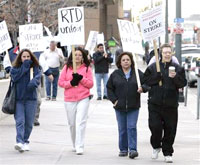Denver transit workers strike
By
Larry Hales
Denver
Published Apr 6, 2006 12:52 AM
Over 1,700 bus drivers, light
rail operators and mechanics, a substantial number of them Black and Latin@,
have gone on strike in Denver. The strike vote on April 2 was 55 to 45 percent
after RTD—the Regional Transporta tion District—offered a contract
with a raise of a paltry 2 percent after three years. The health insurance
premium they are made to pay would not have changed—they now pay $190 per
month for a single person. And there was a mandate clause continuing on in the
new contract.
|
Transit workers on strike.
|
RTD is considered one of the best mass transit systems in
the country and it is the workers that have made that possible. “If they
are number one, we made them that way,” said Patricia Stephens, an
employee for eight years. But executives at RTD decided that it is more
important to give themselves a 47 percent wage increase, while the rank and file
have been under a three-year wage freeze. At least one of the raises amounts to
more than $50,000.
These are highly skilled workers. The bus drivers have
to attend an eight-week intensive training course to earn a license to drive the
buses, and have to log hundreds of hours of driving before carrying passengers.
All together, the bus drivers are required to go through a 12-week course before
driving a regular route.
The conditions for the workers have gotten even
worse over the years, especially for the drivers. According to a union official
at Amalgamated Transit Union, the number of bus drivers has decreased from over
1,000 to 800 in 10 years. The bus drivers operate under dangerous conditions.
The bus drivers talk of having to drive for 90 consecutive days without a
day off, and some have had to take their sick days just to rest. They must keep
on time, no matter the road conditions, have to make transfers to get riders to
their destinations, and when they do take a sick day they are written up for
being late. They are worried about fatigue and their riders’ safety.
It is clear that RTD is not worried about safety, or the ability of their
workers to survive, as the cost of living climbs steadily but wages remain
stagnant.
RTD claims that it operates in a deficit, and this is the
reason that it decided to increase fares from $1.25 to $1.50, a steep increase
for many of the workers that use the mass transit. However, the deficit that
applies to RTD can be traced to the amount of money being drawn for imperialist
war, as nearly 80 percent of the transit system is subsidized. The money being
spent for war and raises for the bosses could go to provide for a cheap means of
transit for the masses.
One worker on the picket line stated that RTD is
looking to privatize. Forty-five percent of RTD work has been contracted out to
private companies, hence the reason that RTD is playing a harder line than might
be expected, and why they even refused arbitration.
The workers at RTD
need support, as RTD is not willing to budge and is seeking to force the workers
into a poor contract. Officials all the way up to Gov ernor Bill Owens are
denigrating the RTD workers. Governor Owens said, “To do it on a Sunday
night before Monday, to do it on opening day, to do it with five hours of
notice, I think the union -at least the 55 percent that voted last night to
strike-showed whose side they are on. They certainly aren’t thinking of
the public; they’re only thinking of themselves.” This kind of talk
isn’t fooling anyone, however, as many riders expressed solidarity with
the striking workers. One rider said, “I think the company is unfair to
the workers. They are greedy.”
RTD certainly cared nothing when it
raised the fares 25 cents and it cared nothing about forcing the drivers to work
long shifts, almost 12 hours a day in split shifts, with four hours in between
two four-hour shifts. RTD cared nothing about forcing workers to work 90 days
straight, to the point of fatigue.
The workers care about safety. They are
holding the line and showing a resolve greater than that of the bosses, and see
the aim of bosses all over the country to drive down wages. They are fighting
for all workers.
Though the union wanted to accept the bogus contract and
had not prepared for a strike, the rank and file has decided that they will
fight for better wages and dignity. Lasonya Jenkins, a six-year employee, summed
their fight up: “We bend over backwards. We do a great job. We want
respect.”
Articles copyright 1995-2012 Workers World.
Verbatim copying and distribution of this entire article is permitted in any medium without royalty provided this notice is preserved.
Workers World, 55 W. 17 St., NY, NY 10011
Email:
[email protected]
Subscribe
[email protected]
Support independent news
DONATE


